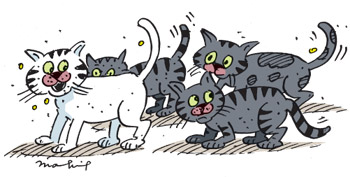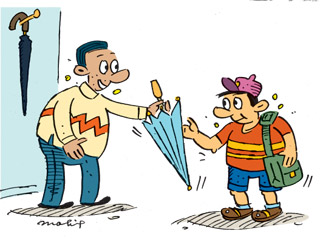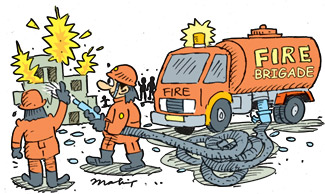|
 by
R. S. Karunaratne by
R. S. Karunaratne
When and where to use ‘one’
The simple word ‘one’ is both a number and a determiner. It can also
be used as a pronoun.
1. One is used to emphasize that you are talking about a single
person or thing.
We have only one bedroom, but they have two.
|

One of the kittens is white;
all the others are black. |
There is one person you must thank for your examination success.
You have one more chance to try your luck.
I am going to follow one of these courses.
He is the one who is going to win.
2. One is used to talk about one member of a group of people or
thing.
Shehan is one of my students.
The thug hit Rohan and broke one of his teeth.
Can you lend me one of those books you bought yesterday?
One of the kittens is white; all the others are black.
I am going to meet one of my friends.
3. One is used to refer to something that has already been mentioned.
A: Would you like an ice cream?
B: I’d love one.
I’ll have a piece of cake - a small one.
|

You take this umbrella and I’ll take the other one. |
You take this umbrella and I’ll take the other one.
A: Which is your briefcase?
B: The one on the table.
4. When one is used as a pronoun it is usually preceded by this,
that, the other, and which.
What do you wish to buy? This one or that one?
I think the other one is better.
Which one do you prefer?
5. There are some set phrases in which one is used.
The students entered the classroom one by one.
The beggars came to collect the donations one after another.
We have known one another for a very long time.
One day you are going to be a teacher.
One night, Sam found a snake in his room.
One evening, we saw some wild elephants crossing the road.
This is a three in one radio. ( It has a radio, cassette player and a
CD player)
Here’s a photocopier, printer and scanner all in one. (It has several
functions)
There were only one or two students in the class. (a small number).
You are the one I can trust.
This may be your one and only opportunity to enter the Law College.
Our principal is one Johnson. (relatively unknown)
On this question we are at one with each other. (agree)
My new friend is one of a kind. (very unusual)
I, for one, think Mr. Thompson is the ideal person for this post. (I
think my opinion is right).
A: What are you doing today?
B: Oh, I’ve got a hundred and one things to do.
The news of his death came as a surprise to one and all. (everyone).
I’d like to make one or two suggestions. (a few)
6. There are many words used along with one usually hyphenated. Let’s
have a look at some of the popular expressions.
The characters in his novels are rather one - dimensional. (boring)
On our way to Anuradhapura we stayed in a one - horse town. (small
and unimportant)
Oscar Wilde’s dramas are full of one - liners. (clever and funny
remarks)
We stayed in a one - star hotel. (not very good)
The minister was a one - time journalist. (in the past).
Oh, George, you’ve got a one - track mind. (Thinking about one
particular thing)
Don’t you know that this is a one - way street. (travelling allowed
only in one direction).
Know your
idioms
Idiomatic expressions are forceful, vivid and brief. At the same
time, idioms are the most difficult part of the language. Here are some
commonly used idiomatic expressions with three possible meanings set
against each idiom.
Tick off (a), (b) or (c) which you think is nearest in meaning to the
given idiom. Check your answers with the key.
1. The two rivals agreed to bury the hatchet.
(a) to make peace
(b) to place a deadbody in the coffin
(c) to bury a short handled axe
2. It is useless crying over split milk.
(a) weep over milk split accidentally
(b) to regret over past events
(c) to cherish fond memories
3. He promised to make amends for his mistakes.
(a) to become better
(b) to compensate for damage
(c) to lie in wait to make a surprise attack.
4. He always tried to walk with God.
(a) to have habitual communion with God
(b) to move towards God
(c) to win an easy victory
5. We’ll have to wait and see. There are wheels within wheels.
(a) There are hidden complications in a scheme
(b) There are many causes of happiness
(c) There are secret clauses in an agreement.
6. I’m trying to see how the land lies.
(a) to see the different modes of life
(b) to consider the circumstances in an emergency
(c) to observer the favourable aspects of a situation.
7. I sent him about his business.
(a) to send a message
(b) to send one on an errand
(c) to dismiss one contemptuously
8. It serves you right!
(a) to treat him as he deserves
(b) to treat one in a favourable way
(c) to make one appear ashamed
9. He advised me to put something by for a rainy day.
(a) to collect food for difficult times
(b) to save money
(c) to enjoy a rainy day
10. You know how to set people by the ears.
(a) to encourage people to be calm
(b) to beat people mercilessly
(c) to provoke people to quarrel
Key
1. (a), 2. (b), 3. (b), 4. (a), 5. (a), 6. (b), 7.
(c), 8. (a), 9. (b), 10. (c)
Starters
Spelling rules
Part II:
1. A final ‘e’ is retained before a suffix beginning with a
consonant.
Hope - hopeful
|

The fire brigade arrived immediately when we phoned them. |
I was hopeful of getting through the examination.
Engage - engagement
I am sorry to disappoint you. I have a prior engagement . (another
arrangement already made)
Immediate - immediately
The fire brigade arrived immediately when we phoned them.
Fortunate - Fortunately
Fortunately, the show hadn’t started when we went to the theatre.
Sincere - sincerely
I am sincerely grateful to my parents. (honestly)
2. Exceptions
The ‘e’ in able/ible is dropped in the adverb form.
Comfortable - comfortably
Can you live fairly comfortably on your salary?
Incredible - incredibly
An incredibly loud bang followed the flash.
3. The final ‘e’ is dropped in the following words.
True - truly
Shakespeare was a truly great dramatist.
Due-duly
I knew I had been wrong and duly apologised.
Whole-wholly (‘L’ is doubled)
I am not wholly convinced by your explanation.
Argue - argument
After some heated argument the meeting was postponed.
Judge - judgement or judgment
The Chief Justice delivered the judgement.
4. words ending in ‘ee’ do not drop an ‘e’ before a suffix.
Foresee - foreseeing - foreseeable
We do not know what will happen in the foreseeable future.
Agree- agreement, agreeing
The two political parties had an agreement not known to the public.
To be continued |

